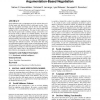Free Online Productivity Tools
i2Speak
i2Symbol
i2OCR
iTex2Img
iWeb2Print
iWeb2Shot
i2Type
iPdf2Split
iPdf2Merge
i2Bopomofo
i2Arabic
i2Style
i2Image
i2PDF
iLatex2Rtf
Sci2ools
ARGMAS
2006
Springer
2006
Springer
Managing Social Influences Through Argumentation-Based Negotiation
Social influences play an important part in the actions that an individual agent may perform within a multi-agent society. However, the incomplete knowledge and the diverse and conflicting influences present within such societies, may stop an agent from abiding by all its social influences. This may, in turn, lead to conflicts that the agents need to identify, manage, and resolve in order for the society to behave in a coherent manner. To this end, we present an empirical study of an argumentation-based negotiation (ABN) approach that allows the agents to detect such conflicts, and then manage and resolve them through the use of argumentative dialogues. To test our theory, we map our ABN model to a multi-agent task allocation scenario. Our results show that using an argumentation approach allows agents to both efficiently and effectively manage their social influences even under high degrees of incompleteness. Finally, we show that allowing agents to argue and resolve such conflicts e...
Approach Allows Agents | ARGMAS 2006 | Argumentation-based Negotiation | Intelligent Agents | Social Influences |
| Added | 13 Oct 2010 |
| Updated | 13 Oct 2010 |
| Type | Conference |
| Year | 2006 |
| Where | ARGMAS |
| Authors | Nishan C. Karunatillake, Nicholas R. Jennings, Iyad Rahwan, Sarvapali D. Ramchurn |
Comments (0)

